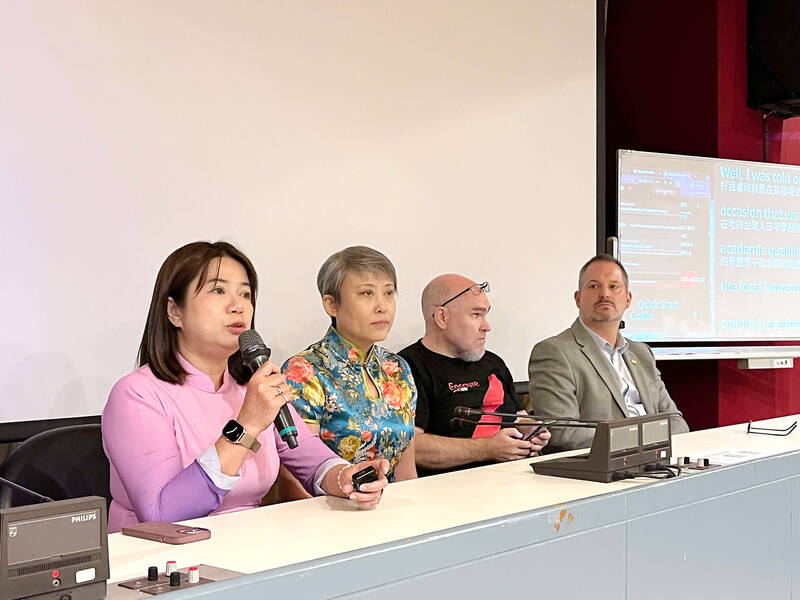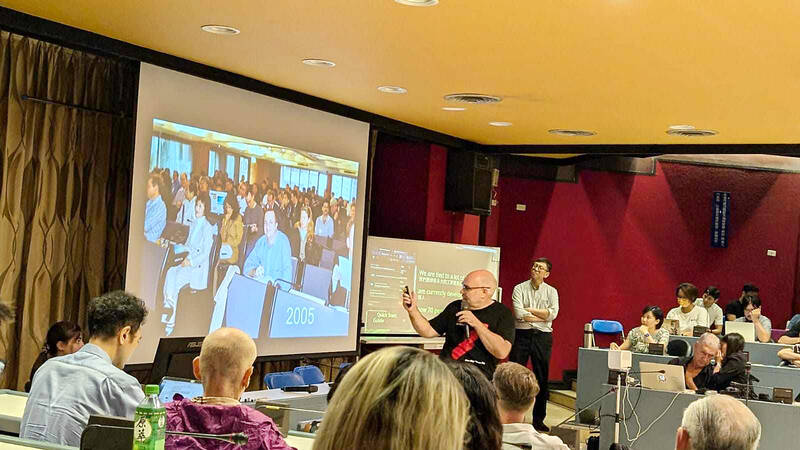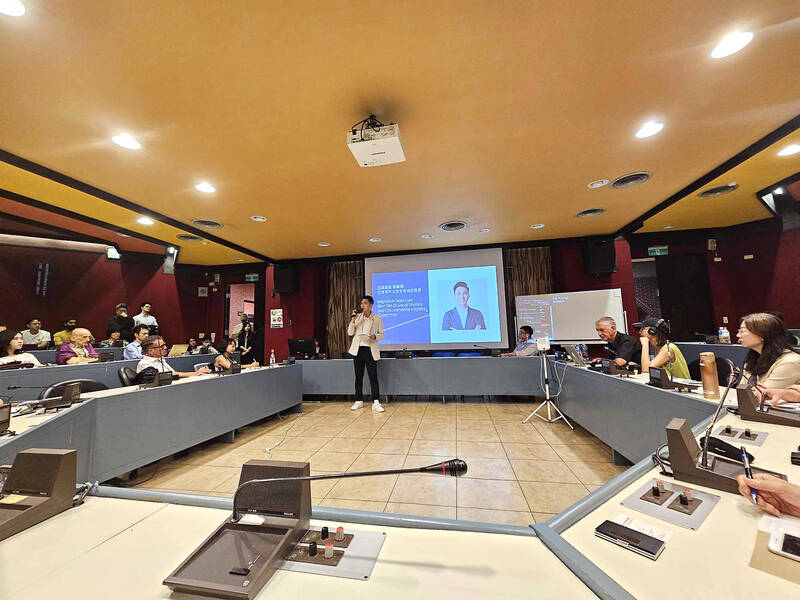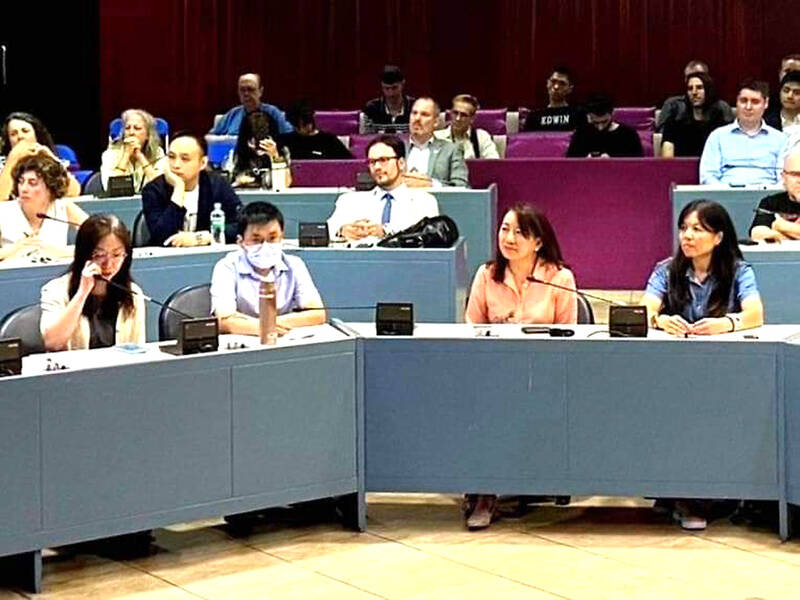If you are a Western and especially a white foreign resident of Taiwan, you’ve undoubtedly had the experience of Taiwanese assuming you to be an English teacher. There are cultural and economic reasons for this, but one of the greatest determinants is the narrow range of work permit categories that exist for Taiwan’s foreign residents, which has in turn created an unofficial caste system for foreigners.
Until recently, laowai (老外) — the Mandarin term for “foreigners,” which also implies citizenship in a rich, Western country and distinguishable from brown-skinned, southeast Asian migrant laborers, or wailao (外勞) — could only ever hold a handful of clearly specified jobs. When I first arrived in Taiwan in the mid-1990s, most laowai got their alien residency cards (ARCs) as English teachers, while a minority filled the roles of businessmen, financiers, journalists, editors, students or missionaries. And that was about it.
Only the last decade has seen significant liberalization of Taiwan’s immigration laws, and the government has largely done so in reaction to issues that are already at crisis levels — a declining birth rate, aging population, talent shortages and the urgent need to internationalize the economy.

Photo courtesy of Crossroads
David Chang (張代偉), secretary general of the NGO Crossroads (社團法人台灣全球連結發展協會), believes that changing Taiwan’s laws to allow foreign residents to become dual citizens to be part of the solution to all these problems.
Though hundreds of thousands of Taiwanese have gained dual citizenship in the US, Canada, Australia and elsewhere, Taiwanese law currently requires all but a few exceptions — those with “exceptional contributions” to Taiwanese society, like long-term missionaries and professional basketball players — to renounce their original citizenship before they can apply to become a citizen of Taiwan.
On Aug. 22, Crossroads and other partners launched the first movement to formally advocate for dual nationality via legal change. Their first step is a petition on a government Web platform for citizen-led regulatory reform that may be signed by either Taiwanese citizens or foreign residents with a valid ARC or Alien Permanent Residency Card (APRC).

Photo courtesy of Crossroads
If this petition, which is currently the most popular on the site, gains 5,000 digital signatures by its Oct 19 deadline, it will force the government to respond and acknowledge the demand for dual nationality for the first time ever. As of the writing of this article, the petition had gained over 3,750 signatures.
‘URGENT’
“This is urgent and needs to be done now,” Chang said. “Taiwan is feeling a talent shortage. Schools are closing [due to lack of students from falling birth rates]. This will take time, but Taiwan’s clock is already ticking.”

Photo courtesy of Crossroads
For Chang, this is foremost an issue of “economic security, national security and national development.”
“Number two,” Chang continued, “it’s the ethical thing to do. People who are thinking of making their lives here for the long term, they don’t always want to be forever classed as foreigners. They want to be integrated into the system identity-wise and be recognized.”
Chang, 42, was born in Pennsylvania and grew up between California and Taipei before attending the University of California, Santa Barbara. A post-college job for a New York state senator gave him his first window into politics and got him thinking about how he could one day “help connect the dots” between the US and Taiwan, he said.

Photo courtesy of Crossroads
In 2010, he moved back to Taiwan and established a translation agency, WordCorp, that aimed to solve Taiwan’s widespread problem of literal but clunky translations that fail to speak to overseas readers.
Through Crossroads, Chang’s specific goal is to add a clause to Article 9 of the Nationality Act that would allow APRC holders of five years or longer to apply for Taiwanese citizenship without renouncing their original citizenship.
Taiwan currently has 891,000 ARC holders, of which around 800,000 are migrant laborers, and 38,000 APRCs holders, according to the Ministry of the Interior.
In most cases, APRCs require five years of legal residency, so under Chang’s plan, dual citizenship would require at least 10 years of total residency.
“We’re emphasizing that this would apply to 38,000 people, just 0.1 percent of Taiwan’s total population. It’s not that scary,” Chang said.
PUSHBACK
Still, there has been some pushback.
“The big one is that a lot of people are worried that this will make it easier for people from China to immigrate to Taiwan and become citizens,” said Michael Fahey, an American bar-certified lawyer with the Taipei firm Formosa Transnational, who acts as counsel to Crossroads.
“But it’s misguided because PRC immigrants, who are all spouses, are governed by a different law that’s only for people from China. But that is totally different from the Nationality Act, which governs [non-PRC immigrants],” Fahey added.
Another common counterargument is what Chang calls the “loyalty issue.”
“A lot of times citizenship, the passport idea, is a question of loyalty in the eyes of many Taiwanese,” Chang said. “They say, just because other countries [allow dual nationality], why should we care that Taiwan is different?”
“And my question is, well, if it’s such a question of loyalty, how about these Taiwanese who go overseas and gain dual citizenship elsewhere? And what about the issue of reciprocity? If other countries already allow dual nationality for Taiwanese, why not offer the same for people from that country?”
In Taiwan, immigration reform is a relatively new idea that’s less than three decades old.
IMMIGRATION REFORMS
One early reform came in 1996, when Taiwan began admitting southeast Asian workers for maximum stays of six years to grow the labor pool. The first APRCs were issued in 2000.
Reform has further accelerated within the past decade. Migrant labor stays have been extended from six to 12 years (or 14 years for caregivers), and some migrant laborers of 11 or more years are now eligible for APRCs — this is the first time ever that Taiwan’s migrants have been given a path to job market free agency.
Most of these changes have been driven by the economic calculus of the National Development Council (NDC), but not all have been successful.
In 2015, Taiwan introduced an entrepreneur visa with the goal of attracting high level talent, but “three years after the visa was launched, it only had 30 or 40 applications, despite a government quota of 2,000 per year,” Chang said.
Taiwan’s next visa innovation of 2018, the Gold Card, has fared better. Gold Cards effectively grant the same privileges of an APRC — an open work permit, a reentry visa and national health insurance — to applicants who can prove income of NT$160,000 per month. More than 10,000 Gold Cards have now been issued.
The NDC also recently announced a “Global Elite” visa for those with an annual salary of more than NT$6 million, and Chang expects the agency to announce a “digital nomad strategy” within the next few months for expats who don’t meet Gold Card income requirements.
“But if Taiwan is going to go this internationalization route,” Chang said, “you have to look at not just at what draws people to Taiwan, but also retention. What are the things that can keep them here?”
For Chang, the keys are “integration, equality and access to services.”
At present, foreign residents often need guarantors for mortgages, business loans and credit cards. They are also not allowed to hire caregivers and are excluded from disability coverage, which are concerns for older expats.
“I've had a credit card for 22 years with a certain bank and there was something wrong with the card and it needed to be replaced. But then I was told that there's a new rule that requires me to have a guarantor now because I'm not a citizen,” said Fahey.
“Everything in Taiwan revolves around having household registration. And as permanent residents, we don't have household registration. Therefore, we cannot live normal lives in Taiwan,” Fahey said.
Many expats, including a solid cohort who arrived in the 1980s and 1990s following the end of martial law, feel the pinch of these subtle exclusions as they enter their third or fourth decade in Taiwan.
“It just seems like a matter of fairness. Reciprocity — the US allows dual nationality, so why not me as a US citizen in Taiwan? I've been here for longer than Taiwan has been a democracy. Over 85 percent of my life has been lived here. Am I not Taiwanese?,” said Eryk Michael Smith, an American journalist in Kaohsiung.
THE PETITION PROCESS
If the petition successfully gathers 5,000 signatures, then Chang said, “the Ministry of the Interior will give me a call and say, ‘OK, so what do you want?’ When I tell them, they’ll say, ‘That’s a legislative issue.’ But we’ve already anticipated that.”
“The campaign right now is actually about attempting to elevate the issue into the national discourse. We’re using the petition as a lightning rod to draw national attention or try to draw conversations to this issue,” Chang continued.
Chang said he’s already in contact with legislators sympathetic to the cause, and believes that within a year, one of them may broach the issue on the legislative floor.
Other petition supporters include the immigration reform organization Forward Taiwan, Winkler and Partners law firm, businessman Chu Ping (朱平), Commonwealth Magazine (天下雜誌) and several foreign chambers of commerce. (The American chamber is not currently among them.)
Fahey, however, cautioned that affecting legal change could take five to 10 years or longer.
“This kind of cause takes years. So people need to have realistic expectations. But we’ve got to get this petition first. That’s the first step,” he said.
The petition is online: tinyurl.com/TWdualnationality.
English petition instructions can be found at: tinyurl.com/TWDNPinstructions.

April 14 to April 20 In March 1947, Sising Katadrepan urged the government to drop the “high mountain people” (高山族) designation for Indigenous Taiwanese and refer to them as “Taiwan people” (台灣族). He considered the term derogatory, arguing that it made them sound like animals. The Taiwan Provincial Government agreed to stop using the term, stating that Indigenous Taiwanese suffered all sorts of discrimination and oppression under the Japanese and were forced to live in the mountains as outsiders to society. Now, under the new regime, they would be seen as equals, thus they should be henceforth

Last week, the the National Immigration Agency (NIA) told the legislature that more than 10,000 naturalized Taiwanese citizens from the People’s Republic of China (PRC) risked having their citizenship revoked if they failed to provide proof that they had renounced their Chinese household registration within the next three months. Renunciation is required under the Act Governing Relations Between the People of the Taiwan Area and the Mainland Area (臺灣地區與大陸地區人民關係條例), as amended in 2004, though it was only a legal requirement after 2000. Prior to that, it had been only an administrative requirement since the Nationality Act (國籍法) was established in

With over 80 works on display, this is Louise Bourgeois’ first solo show in Taiwan. Visitors are invited to traverse her world of love and hate, vengeance and acceptance, trauma and reconciliation. Dominating the entrance, the nine-foot-tall Crouching Spider (2003) greets visitors. The creature looms behind the glass facade, symbolic protector and gatekeeper to the intimate journey ahead. Bourgeois, best known for her giant spider sculptures, is one of the most influential artist of the twentieth century. Blending vulnerability and defiance through themes of sexuality, trauma and identity, her work reshaped the landscape of contemporary art with fearless honesty. “People are influenced by

The remains of this Japanese-era trail designed to protect the camphor industry make for a scenic day-hike, a fascinating overnight hike or a challenging multi-day adventure Maolin District (茂林) in Kaohsiung is well known for beautiful roadside scenery, waterfalls, the annual butterfly migration and indigenous culture. A lesser known but worthwhile destination here lies along the very top of the valley: the Liugui Security Path (六龜警備道). This relic of the Japanese era once isolated the Maolin valley from the outside world but now serves to draw tourists in. The path originally ran for about 50km, but not all of this trail is still easily walkable. The nicest section for a simple day hike is the heavily trafficked southern section above Maolin and Wanshan (萬山) villages. Remains of